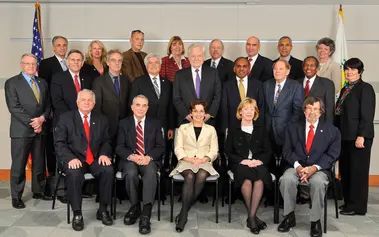Protests Erupt Over Kristi Noem’s Honorary Degree at Dakota State University Graduation
In the heartland of America, the picturesque city of Madison, South Dakota, became the epicenter of a heated debate on May 10, 2025, as hundreds of protesters congregated outside Dakota State University. The reason behind this fervor was the conferring of an honorary doctorate degree of public service to Kristi Noem, the current Homeland Security Secretary and former governor of South Dakota.
The protests, organized by a coalition of local groups and university stakeholders, were a reaction to what many saw as a controversial decision. Noem, known for her policies as South Dakota’s Governor and actions as DHS Secretary, stirred both admiration and dissent. Her honorary degree and the decision to have her address the graduating students were contentious.
More than 3,700 individuals expressed their opposition through a Change.org petition, urging the university to rescind Noem’s honor. This online petition underscored the community’s disapproval, which was mirrored by the votes of both the DSU Student Senate and General Faculty against the degree nomination.

Kristi Noem
Protesters wielded signs with bold messages such as “No honor for Noem” and “Our commencement, our vote!” These placards highlighted the tension between DSU administration’s decision and the preferences of its students and faculty. Local group Madison Area Stands Together played a pivotal role in organizing the demonstrations, ensuring diverse representation from students, alumni, and community members.
Inside the ceremonial halls, more than 341 undergraduates and 124 graduate students gathered for what was to be a significant milestone in their educational journey. Noem, addressing the largest graduating class in DSU’s history, shared five pieces of advice she wished she had known earlier in her life.
Her speech centered around self-belief and the importance of relationships. “You are unique and equipped with abilities that the world desperately needs,” she told the graduates, encouraging them to shed insecurities. For many, however, the event remained overshadowed by the controversy surrounding her presence and recognition.
The discord was not limited to the university’s present stakeholders. Several DSU alumni and faculty expressed their displeasure at the handling of the honorary degree process. Calls for the administration to respect the votes against the nomination were widely echoed, with many describing the situation as “disgraceful.”

José-Marie Griffiths
DSU President José-Marie Griffiths, who nominated Noem, justified the degree by emphasizing her enduring support for the university’s cybersecurity initiatives. Noem’s contribution to advancing STEM education in South Dakota was recognized amidst the backdrop of political and public relations challenges.
Anden Wieseler, Vice President of the Student Senate, was vocal in his criticism, stating that the decision undermined student’s voices. The sentiment echoed throughout the crowd as many attendees took a stand, using their right to free speech to vocalize their discontent.
Moreover, the protest saw participation from Taneeza Islam, CEO of South Dakota Voices for Peace, and Melissa McCauley from South Dakota Voices for Justice. Both highlighted that the honorary award contradicted the core values they hoped the university would uphold.
Reflecting on the day, attendees like Emmett Brown, a junior network security major, felt that Noem’s recognition was more reflective of political ties than academic contributions. For him and many others, the event cemented a need for clearer alignment between university values and its honorary gestures.
As South Dakota stands poised as a burgeoning center for technological advancement, the events at DSU underscore the complexities of accolading public figures amidst divided public opinion. This day in Madison will linger in the collective memory as a call for introspection and inclusivity in the higher echelons of academia.
The conversation about the intersection of politics, education, and community trust continues, urging stakeholders across South Dakota to contemplate the narratives formed around such influential decisions.